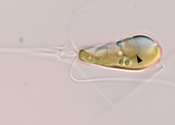Scientists discover first nitrogen-fixing organelle
Modern biology textbooks assert that only bacteria can take nitrogen from the atmosphere and convert it into a form that is usable for life. Plants that fix nitrogen, such as legumes, do so by harboring symbiotic bacteria ...









